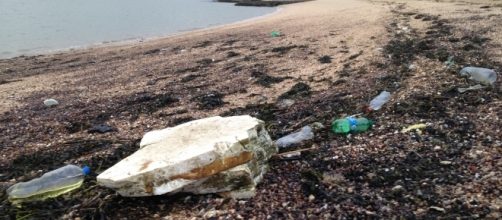Take a quick look around your local town, and I am willing to bet that you will see a variety of human-created waste tumbling about on the ground. It might have even come from a nearby rubbish bin. Perhaps there will even be refuse-collection workers retrieving this debris. But what happens to this garbage when it is left to blow about in the wind? Some of it will be blown into a river or lake, or straight to the sea and right into the gullet of a seagull or fish.
This is our fault
On Monday, October 9 I drove to my local beach. Immediately I saw rubbish on the ground, but after the short walk to the seafront, I did not have to search far to find mostly plastic garbage scattered over the sandy beach.
I documented it and collected a bunch of it in a bag, but there was so much, from the obvious plastic bottles to tiny pieces of plastic such as shreds of plastic bags, plastic straws, and plastic bottle-cap sealers. It made my heart sink. I felt physically ill and distraught witnessing even just a finite example of this environmental catastrophe. We have to fix this problem! There is no other option! It is certainly not an issue that can be ignored with an excuse like it is made up by this or that group, or by suggesting that people did not create the problem. In this case, there is absolutely no other reason. Humans invented plastic!
We were warned
There was once a famous Okinawan martial arts master, born in 1868, who lived in Japan from 1922 until his death in 1957.
He wrote several manuscripts which include philosophical teachings for life. One of these texts lists his "twenty precepts". The seventh precept is "Calamity springs from carelessness" The Twenty Guiding Principles of Karate, English Edition, 2003, (originally published within Karate-Do Taikan in 1938) - Page 49-50; 'Negligence or idleness is the root of misfortune. We, as the so-called dominant species of this little planet, must not be careless. If not for the sake of other creatures, we will destroy ourselves! There are so many issues for us to tackle. We cannot turn our backs on even one of them. Some, indeed, are more important than others. The environment, for instance, has to be placed right at the very top of our agenda for change.
Otherwise, we won't have to worry about political disputes, financial concerns, or war. We will have nothing to eat. If we don't each take diligent care, starting right now, there will be no reversal. And after just several hundred years of exponential industrial development up to the present day of complete commercialism, we will have extinguished a vast number of species including ourselves'.
Food for thought?


